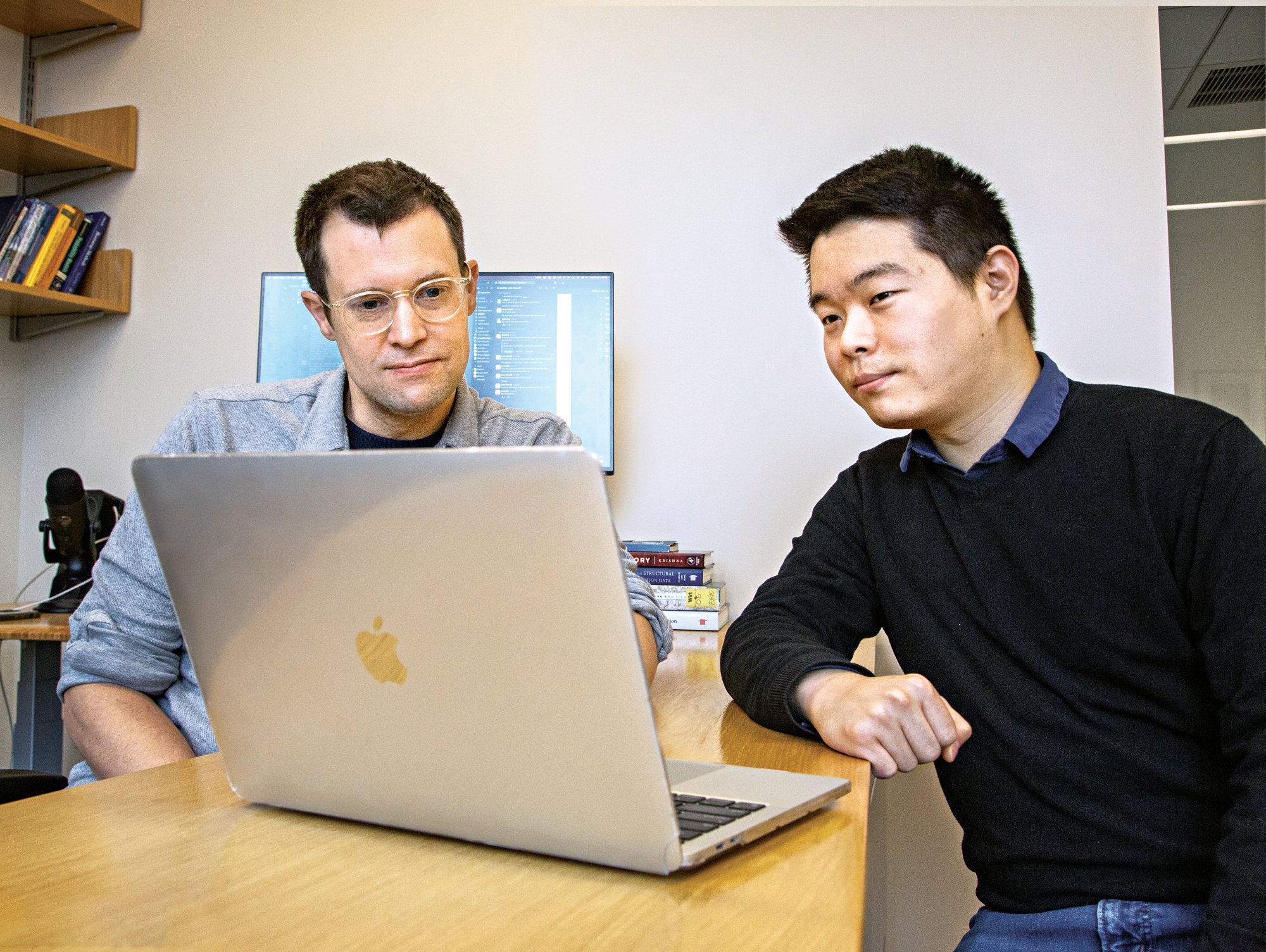
Tobias Salz (left), the Castle Krob Career Development Associate Professor of Economics, is working with economics predoctoral research fellow Wonjoon Choi PhD ’12 on a large project on the search engine market. Their collaboration is part of a pilot of the new predoctoral program. Choi has been “instrumental in many parts of the project, including the design of an experiment and data analysis,” says Salz.
PHOTO: JON SACHS
A new fundraising initiative for the Department of Economics led by Roger Altman, former chair of the MIT Economics Visiting Committee and life member emeritus of the MIT Corporation, seeks to take the department into a new era of achievement, fostering innovative research that addresses national and global challenges. Launched in 2023, the initiative is almost halfway to its $60 million goal.
“MIT has managed to be one of the best economics departments in the country while existing in the middle of a science and engineering school,” says Altman. “It’s a rare accomplishment.”
“Roger has been amazing in terms of his leadership, his giving, and his encouragement of others in their philanthropy,” says Jonathan Gruber ’87, Ford Professor of Economics and department head. Altman, cofounder and senior chairman of the investment firm Evercore and a long-time champion of MIT economics, is supporting the initiative with a gift from the Altman Family Fund to launch the Economics Predoctoral Program and to support faculty research.
Other major contributions include gifts to establish the Daniel and Gail Rubinfeld Professorship Fund in Economics, the Thapanee Sirivadhanabhakdi Techajareonvikul Professorship Fund established by economics undergraduate alumna and her husband, Aswin Techajareonvkul MBA ’02; the Locher Economics Fund for faculty research established by Kurt ’88, SM ’89 and Anne Stark Locher; the Dr. James A. Berkovec Memorial Faculty Research Fund in Economics, created by Ben Golub ’78, SM ’82, PhD ’84, and another endowed professorship in the department; and individual gifts from many other generous friends and alumni.
Predoctoral fellowships key for aspiring graduate students
As Gruber explains, the field of economics has undergone significant changes in recent decades, due in large part to the massive increase of available data. While this is a boon for innovative research, he says, “it’s incredibly intensive because you’re working with gigabytes and terabytes of data.”
Expanded research teams can help to process such abundant data and use rigorous, empirical methodology to explore complex issues. “This is ‘big lab’ science,” says Gruber, “and it requires a lot of people working together. That’s where predocs can make a big difference.”
Predoctoral fellowships are designed for college graduates who plan to apply to graduate school. “It’s an incredible match,” says Gruber. While the highly motivated predoctoral students gain the experience and mentorship needed for graduate-level work, their MIT mentors get additional team members to help with labor-intensive research projects. The Economics Predoctoral Program will enable six junior faculty members to each hire a predoctoral fellow this year, with plans to fund up to 24 positions in the long run.
Research rooted in key global issues
Economics research may often be anchored in financial data, but the field looks far beyond money to understand people, communities, and the interactions of human society and the planet.
“We have research that is changing the world,” says Gruber, pointing to the example of the groundbreaking antipoverty work of the department’s Abdul Latif Jameel Poverty Action Lab (J-PAL), a global research center anchored at MIT. “If you look at the research that J-PAL has done and the government policies that are based on that research, they’ve impacted the lives of 600 million people around the world.”
Gruber points to several consequential areas of economic research at MIT: the impact of artificial intelligence on the labor market and labor policy; preparing the existing long-term care infrastructure to serve an aging US population; and strategies to help countries at all stages of development cope with climate change. “These are all first-order questions that speak to social and economic issues that need to be tackled,” he says. “Roger and the other generous individuals who are supporting this initiative are bringing us closer to that.”
Altman notes that his own enthusiastic support of MIT’s Department of Economics stems from his interactions with economists while serving in the US Department of the Treasury during the Carter and Clinton administrations. “I have a longstanding serious interest in public policy as it intersects with economics.”
Altman has every confidence that philanthropic support of MIT economics faculty, students, and the new predoctoral program is worthwhile. “Every time I’m on the campus, I’m awed by the faculty and students that I interact with even briefly. MIT is just an extraordinary collection of talent and motivation.”
Give now: Support the Department of Economics